
The Bolsheviks, led by Vladimir Lenin, were a far-left faction of the Marxist Russian Social Democratic Labour Party (RSDLP) which split with the Mensheviks at the Second Party Congress in 1903. The Bolshevik party seized power in Russia in the October Revolution of 1917, and was later renamed the Communist Party of the Soviet Union. Their ideology and practices, based on Leninist and later Marxist–Leninist principles, are known as Bolshevism.
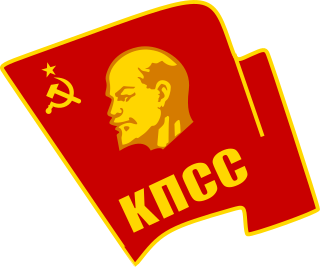
The Communist Party of the Soviet Union (CPSU), at some points known as the Russian Communist Party, All-Union Communist Party and Bolshevik Party, and sometimes referred to as the Soviet Communist Party (SCP), was the founding and ruling political party of the Soviet Union. The CPSU was the sole governing party of the Soviet Union until 1990 when the Congress of People's Deputies modified Article 6 of the 1977 Soviet Constitution, which had previously granted the CPSU a monopoly over the political system. The party's main ideology was Marxism–Leninism.

The Socialist Unity Party of Germany was the founding and ruling party of the German Democratic Republic from the country's foundation in 1949 until its dissolution after the Peaceful Revolution in 1989. It was a Marxist–Leninist communist party, established in 1946 as a merger of the East German branches of the Communist Party of Germany and Social Democratic Party of Germany.
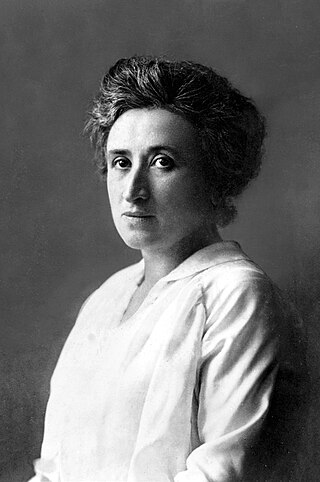
Rosa Luxemburg was a Polish and naturalised-German revolutionary socialist, orthodox Marxist, and anti-War activist during the First World War. She became a key figure of the revolutionary socialist movements of Poland and Germany during the late 19th and early 20th century, particularly the Spartacist uprising.

The Communist International (Comintern), also known as the Third International, was an international organization founded in 1919 that advocated world communism, and which was led and controlled by the Communist Party of the Soviet Union. The Comintern resolved at its Second Congress in 1920 to "struggle by all available means, including armed force, for the overthrow of the international bourgeoisie and the creation of an international soviet republic as a transition stage to the complete abolition of the state". The Comintern was preceded by the dissolution of the Second International in 1916. Vladmir Lenin and Leon Trotsky were both honorary presidents of the Communist International.
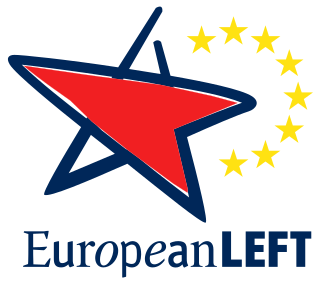
The Party of the European Left (PEL), or European Left (EL), is a European political party that operates as an association of democratic socialist and communist political parties in the European Union and other European countries. It was formed in January 2004 for the purposes of running in the 2004 European Parliament elections. The PEL was founded on 8–9 May 2004 in Rome. The elected MEPs from member parties of the PEL sit in The Left in the European Parliament – GUE/NGL group in the European Parliament, though not all PEL members are also members of GUE/NGL.

Adolph Abramovich Joffe was a Russian revolutionary, a Bolshevik politician and a Soviet diplomat of Karaite descent.
The history of the Communist Party of the Soviet Union was generally perceived as covering that of the Bolshevik faction of the Russian Social Democratic Labour Party from which it evolved. In 1912, the party formally split, and the predecessor to the Communist Party of the Soviet Union became a distinct entity. Its history since then can roughly be divided into the following periods:

The Communist Workers' Party of Germany was an anti-parliamentarian and left communist party that was active in Germany during the Weimar Republic. It was founded in 1920 in Heidelberg as a split from the Communist Party of Germany (KPD). Originally the party remained a sympathising member of Communist International. In 1922, the KAPD split into two factions, both of whom kept the name, but are referred to as the KAPD Essen Faction and the KAPD Berlin Faction.

Virendranath Chattopadhyaya, also known by his pseudonym Chatto, was a prominent Indian revolutionary who worked to overthrow the British Raj in India using armed force. He created alliances with the Germans during World War I, was part of the Berlin Committee organising Indian students in Europe against the British, and explored actions by the Japanese at the time.
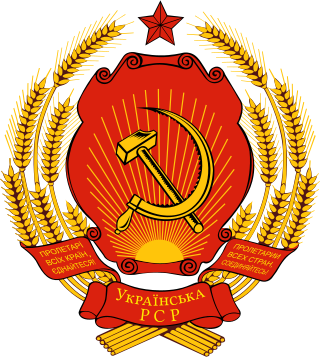
The Communist Party of Ukraine was the founding and ruling political party of the Ukrainian SSR operated as a republican branch of the Communist Party of the Soviet Union (CPSU).
Heinrich Brandler was a German communist, trade unionist, politician, revolutionary activist, and political writer. Brandler is best remembered as the head of the Communist Party of Germany (KPD) during the party's ill-fated "March Action" of 1921 and aborted uprising of 1923, for which he was held responsible by the Communist International. Expelled from the Communist Party in December 1928, Brandler went on to become co-founder of the Communist Party of Germany Opposition, the first national section of the so-called International Right Opposition.
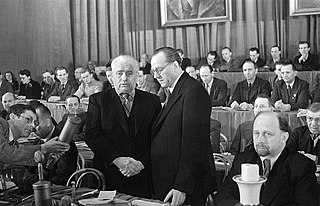
The East German branches of the Communist Party of Germany (KPD) and the Social Democratic Party of Germany (SPD) merged to form the Socialist Unity Party of Germany (SED) on 21 April 1946 in the territory of the Soviet occupation zone. It is considered a forced merger. In the course of the merger, about 5,000 Social Democrats who opposed it were detained and sent to labour camps and jails.

Karl Berngardovich Radek was a revolutionary and writer active in the Polish and German social democratic movements before World War I and a Communist International leader in the Soviet Union after the Russian Revolution.

The Mensheviks were a faction of the Marxist Russian Social Democratic Labour Party (RSDLP) which split with Vladimir Lenin's Bolshevik faction at the Second Party Congress in 1903. The Mensheviks were led by Julius Martov and Pavel Axelrod.

The Second International (1889–1916) was an organisation of socialist and labour parties, formed on 14 July 1889 at two simultaneous Paris meetings in which delegations from twenty countries participated. The Second International continued the work of the dissolved First International, though excluding the powerful anarcho-syndicalist movement. While the international had initially declared its opposition to all warfare between European powers, most of the major European parties ultimately chose to support their respective states in World War I. After splitting into pro-Allied, pro-Central Powers, and antimilitarist factions, the international ceased to function. After the war, the remaining factions of the international went on to found the Labour and Socialist International, the International Working Union of Socialist Parties, and the Communist International.
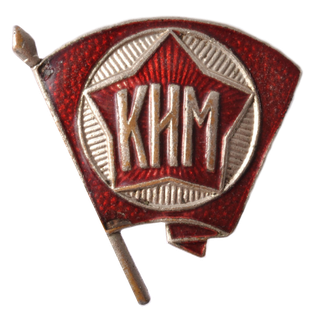
The Young Communist International was the parallel international youth organization affiliated with the Communist International (Comintern).

The Spartacus League was a Marxist revolutionary movement organized in Germany during World War I. It was founded in August 1914 as the International Group by Rosa Luxemburg, Karl Liebknecht, Clara Zetkin, and other members of the Social Democratic Party of Germany (SPD) who were dissatisfied with the party's official policies in support of the war. In 1916 it renamed itself the Spartacus Group and in 1917 joined the Independent Social Democratic Party of Germany (USPD), which had split off from the SPD as its left wing faction.
This Central Committee of the 5th Congress of the Russian Social Democratic Labour Party was in session from 19 May 1907 until 17 January 1912.
The Central Committee of the 6th Conference of the Russian Social Democratic Labour Party (Bolsheviks) was in session from 17 January 1912 until 3 August 1917.















